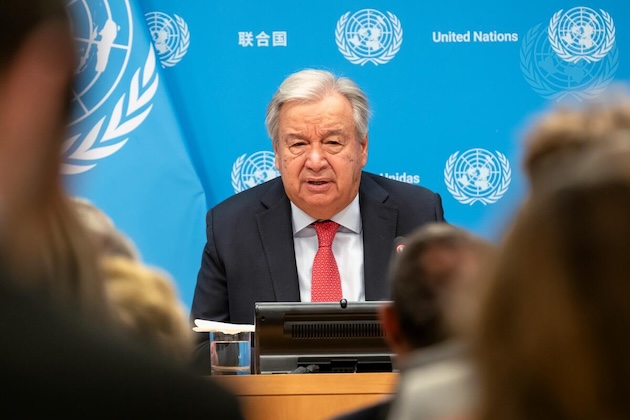
UNITED NATIONS, Sept 19 (IPS) – As the United Nations prepares to host the international community for a week of high-level meetings, the UN chief is calling on world leaders to commit to universal agreements to work toward solutions.
On Wednesday, Secretary-General António Guterres spoke to reporters ahead of the upcoming 79and high-level session of the UN General Assembly and the Summit of the Future. This year’s General Debate and the upcoming Summit will seek to find solutions for institutional reform and to address a wide range of interlinked issues, including climate, forced displacement and conflict.
“Crises interact and feed into each other, for example as digital technologies spread climate disinformation that deepens mistrust and fuels polarization,” Guterres said. “Global institutions and frameworks today are grossly inadequate to deal with these complex, even existential, challenges.”
For Guterres and the UN, the coming Top of the future will focus on the deeper problem of reforming the multilateral systems that have been in place since the organization’s founding. “So many of the challenges we face today were not on the radar 80 years ago, when our multilateral institutions were born,” he said. “Our founders understood that times would change. They understood that the values that underpin our global institutions are timeless, but the institutions themselves cannot be frozen in time.”
What will distinguish the Summit of the Future from previous high-level gatherings, such as the 2016 SDG Summit, is its focus on proposed solutions that need to be applied to the larger problems that affect the world and its institutions today. According to Guterres, this should contrast with the Sustainable Development Goals and their focus on the specific problems that need to be addressed.
“One of the very important aspects of the Summit of the Future is the recognition that our institutions need to be reformed,” Guterres said. “The Summit of the Future takes into account the fact that in order to implement the SDGs … all extraordinary declarations, we need to reform institutions.”
One of the main calls for reform was for the Security Council. This includes the demand to improve the representation of member states from Asia, Latin America and Africa.
Guterres noted that the Council was formed in a post-war world, during a period when many countries, such as those in Africa, were still under colonial rule. In the case of Africa, they are underrepresented with diminished influence.
“Nowhere is this inequality more evident and, I would say, more unacceptable than in the United Nations Security Council, where, for example, you have three European permanent members and not a single African permanent member, which of course does not correspond at all to the current situation in the world,” he said.
Guterres did not indicate whether there was a timeline for implementing the reforms, noting that member states must first adopt the Pact for the Future, one of the key documents currently being drafted, before moving forward. He suggested that there would be agreement on improving transparency and procedure within the council, but also expressed scepticism that certain aspects, such as the veto, would be abolished altogether.
As world leaders and stakeholders across the international community gather in New York for the High-Level Meeting week, the spirit of cooperation and shared solidarity is more important than ever. Guterres stressed the need for member states to finalize the terms of the outcome documents in time for the first day of the Summit.
The UN and its partners aim to strengthen multilateral systems at a time of increasing hostility and conflicts breaking out around the world, including the most recent news of explosions in Lebanon. When asked if it seemed the world was heading toward a global conflict like World War III, Guterres said, “I think we are perfectly in time to avoid the transition to World War III.”
He added: “What we see is a multiplication of conflicts and the feeling of impunity… It is a feeling of impunity everywhere. I mean, every country or every military entity, militias… feel that they can do whatever they want because nothing will happen to them… And the fact that nobody takes seriously the capacity of the powers to solve problems on the ground, makes the level of impunity enormous.”
“I am much more concerned about the dramatic impact on the lives of civilians, women, children and the elderly, everywhere. Of Sudan, of Myanmar, of Gaza, than about the risk of World War II… World War III, which I still believe we have all the conditions to avoid.”
© Inter Press Service (2024) — All rights reservedOriginal source: Inter Press Service







